The county known as Harford is so wide, mein Herr. They’ve got theatres up and down and side to side, mein Herr. I don’t always get them all, at least I tried, mein Herr. So I see… and I go… play by play… night by night…show by show… and this show— a truly remarkable and superbly stunning production of Kander & Ebb’s Cabaret is waiting to welcome you through its doors at Phoenix Festival Theatre. Leave your troubles behind. Because PFT’s Cabaret has no troubles. Directed and Choreographed by the incomparable legend Bambi Johnson, with even-the-orchestra-is-beautiful-Musical-Director Shane Jensen, this, meine damenund Herren, mesdames et messieurs, ladies and gentlemen… this is NOT your grandma’s Cabaret. This is an unapologetic raw reality of what Kander & Ebb (and librettist Joe Masteroff) were trying to encapsulate when they wove this musical into its glistening and deceptive web of wondrously tragic beauty. Pulling out all the stops, Johnson and her team of astonishing creatives, musicians, and performers, will leave you stunned, truly gutted, and really squirming in your seat as you attempt to absorb all of the twisted beauty that is hiding just beneath the surface of Cabaret’s façade.
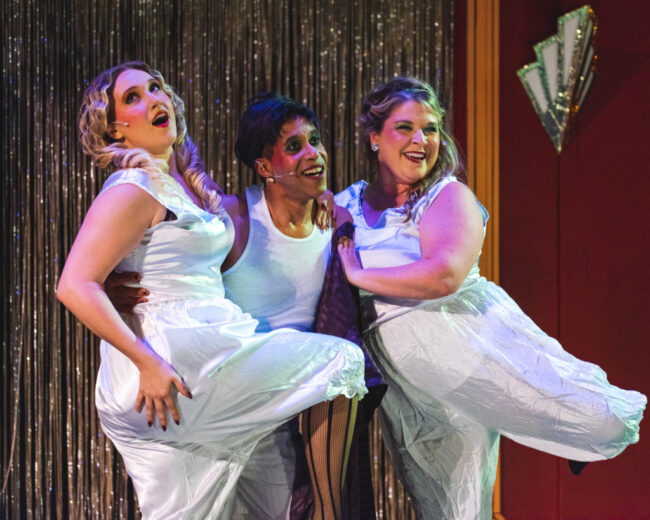
The set is beautiful. The costumes are beautiful. Even the orchestra is beautiful! Acting as his own sort of master of ceremonies, William Price III is the master set and light designer for this production of Cabaret and he creates a fulfilling backdrop for the story-forward and imaginatively unhinged production that Director & Choreographer Bambi Johnson is putting into motion. There’s a set of cascading side-steps that come together to create the platform that houses the live orchestra pit (Music Director & Conductor Shane Jansen, Sam Romero reed1, Amy Nines reed2, Brian Rodriguez trumpet, Joshua Baker trombone, EJ Reilly bass, Andrew McDonnell percussion, Jarrett Rettman synth, Terri Matthews piano) and ultimate serves as the ‘observation deck’ of both the Kit Kat Club and the show as a whole. The set itself is dipped in a vibrant blood-red coloring with intricate and splashy gold accents and outlines. Two doors, a shimmer curtain, and two sparse rooms on either of the far-reaching sides of the stage and voila! Seems simple, no? Deceptively so. There’s also actual Kit Kat Club tables with period-appropriate phones that rim the outer apron of the stage, creating a ‘show-within-a-show’ at various moments throughout. Price III’s lighting design is as impressive as his deceptively simple set. There’s a lot of tightly focused spotlight usage, including the opening tight-light from dead center to highlight the Emcee as the show gets underway. What there isn’t a lot of is crazy, splashy colored lights (Kander & Ebb have a song for that, “Where Are My Colored Lights?” and the answer is… in a show where they belong— not here!) He doesn’t fall into the conventional trap of washing the stage in green for “Money” or doing the mirror ball for “Married.” It feels authentically original, bare-bones-beautiful and really draws the attention as a subtle augmentation of Johnson’s genius all throughout the performance.
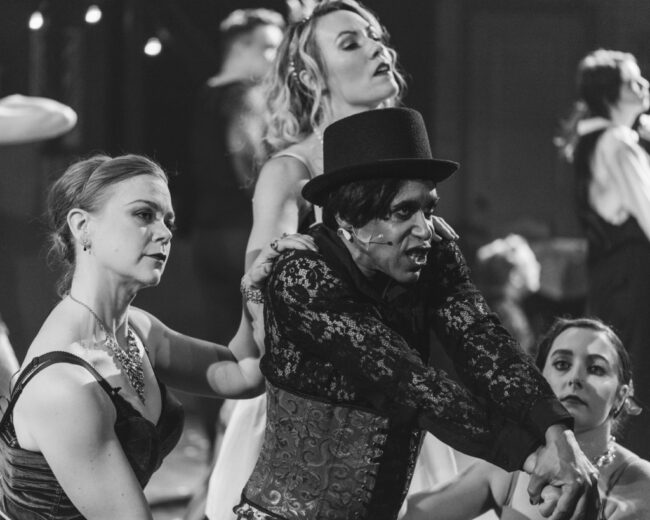
We’ll get to Johnson and her Magical Mystery Genius Reimagination of Cabaret in a moment; I feel like I need a whole separate book to give that one the full-on, non-spoiler discussion it deserves, but I’ll try my best after we talk about the beautiful orchestra. Shane Jansen, who works vocal blending sorcery to create some truly effecting and bone-chilling moments of unified singing from the ensemble, is also a master wizard when it comes to giving the show’s live pit all of its due. The fact that Johnson and Jensen (quick, somebody trademark that as a ‘Dream-team Duo’!) successfully acquired— not just a live pit orchestra for this production (something that isn’t always possible at the community-theatre level given budget or spatial restrictions) but fitted them so flawlessly into the performance that it felt like they were their own subtle character existing in the background. They’re even dressed beautifully (shoutout to costumers Brenda Kinzinger & Joyce Williams for keeping them aesthetically in-line!) Jansen understands how and when to vamp, keeping a surreptitious and subtle eye on the action below to know exactly when to start, stop, continue, and carry-on. And it’s quickly becoming the word of the review— even though there’s a myriad of other stand-in words that I prefer to use, but everyone can hear the Emcee say it in that singsong elongated way (if you’ve ever seen or heard Cabaret, and after you see it at PFT, you’ll hear Eyvo singsong-speaking it every time you read it here in print), but Jansen makes both the cast and the orchestra sound ~beautiful~.
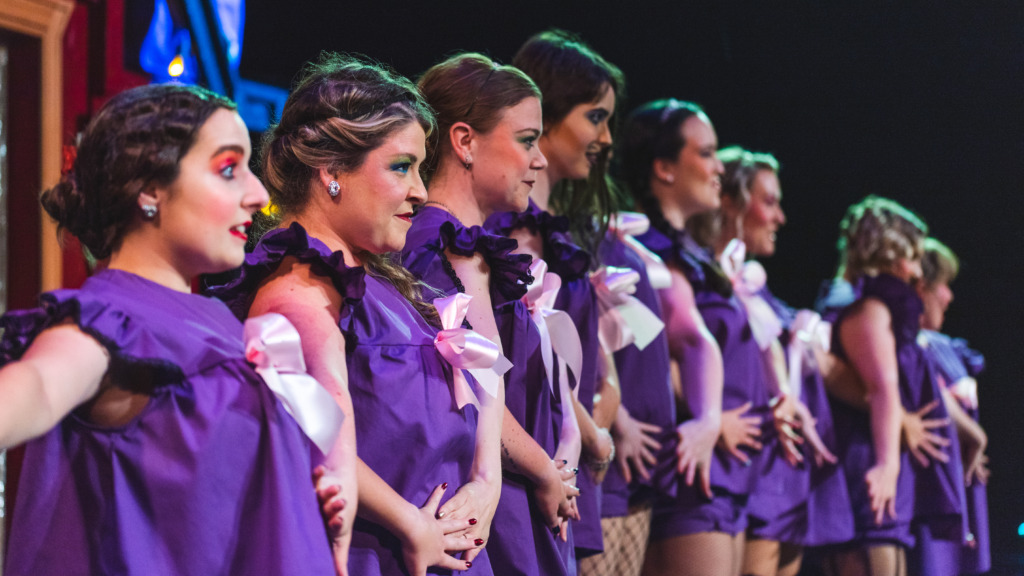
Kinzinger & Williams, another dream-team duo, though this time on the sartorial selection side of things, has not only outfitted the orchestra in their Kit Kat Club finest, but they’ve kept the overall costume design of the production beautifully balanced. Each of the KKC girls has a colored corset top, stylized and fit to their character-personalities. Everyone’s got different hosiery and shoes, giving them their own unique flavor. These aren’t just working girls in a smoldering, underground life trying to get by; they’re real individuals— humorous and naughty though they may be from time to time— and you see that truly reflected in Kinzinger and Williams’ selections. This makes the transition at the end of the performance that much more striking and harrowing. (See if you notice how quickly all the fabulous glittery, eye-popping makeup disappears in that moment too. It’s one of those ‘devil’s in the details’ moments that you can’t even absorb because the emotional tsunami is crashing over you, but because of that choice, said tsunami is that much more impactful.) There’s shades of monochrome that populate the Emcee’s wardrobe as well…playing into the enigmatic mystery of exactly how the Emcee fits into this narrative…black and white…good guy or bad guy… or something in-between. The purple baby-doll dresses and frilly bloomer shorts for “Don’t Tell Mama” are just the right level of saucy-destroyed-innocence to bring a fun frilly feature to that number and the twinkle gown (that’s done in a wildly clever, almost puppet-mannequin reveal) featured on Fraulein Schneider during her engagement party is dazzling.
There is a level of inert professionalism that accompanies the choreographic expectations of a Bambi Johnson show, particularly when she is both director and choreographer. Johnson lives up to, far surpasses, and completely outdoes herself when it comes to choreographing Cabaret. As mentioned, this is not your grandma’s Cabaret, and part of that is the dancing. There’s a lot of iconic moments— chairs being utilized for more scintillating moves during “Mein Herr” and her use of vertical-spatial levels— having dancers on the floor, having dancers in the crouch, etc.— is a superb fit for the intricately moving music of Kander & Ebb. The number that really blows the mind is “Money.” Everyone expects that number to be kitschy (and honestly, splashed in uniform green via lighting and costumes… though you do get the subtlest little nod with an emerald corset slapped around the Emcee for this number. And there’s no other great place to put this, but there’s a money-glitter-rain-shower at the end of the number that is just stupendous.) But Johnson has transformed this number into some sort of hypnotic nightmare fuel that you’ll be mulling over for days to come. The jarring, staccato, jerking motions of the ensemble makes them look like dysfunctional music-box-dolls. It is the epitome of that old quote about art being meant to comfort the discomforted and discomfort the comfortable. But there’s more to Johnson’s choreo than the fascinating carnival of terrifying mannequins. “Kickline” lives up to its namesake and then some with conjoined rotating kickline movements, all sorts of wild and fascinating skill-sets on display, including the Emcee doing a solo series of high kicks. It’s astonishing and magical and well worth all of the praise and applause it receives at the top of Act II.
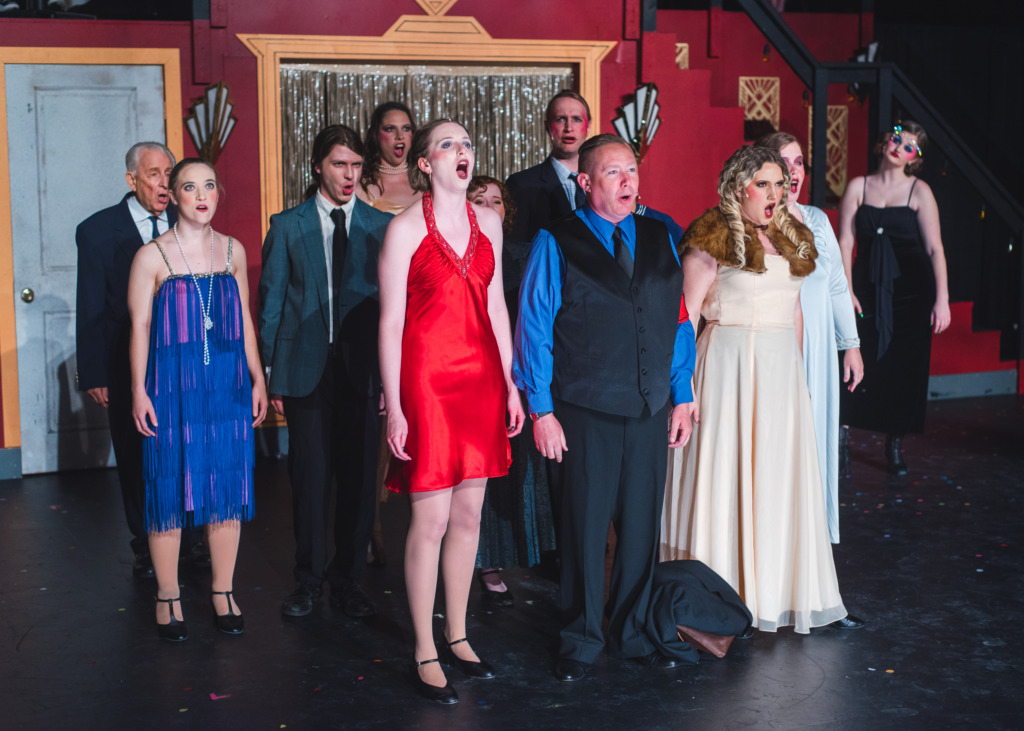
Johnson as a director creates a sort of theatrical magic that truly defies accurate description. It just has to be seen to be believed. Most people groan and roll their eyes when they hear the phrase “reconceptualizing” or “putting a concept on it.” But not with the way Johnson approaches a show, and Cabaret is no exception. There is no question that Cabaret is dark. It’s disorienting because so much of the music is lyrically dissonant, upbeat, and splashy. But girdle your guts, folks, because this one hits and hits hard in the emotional-spleen. And Johnson doesn’t hold back, she doesn’t shy away from the grit and darkness, and she really finds ways to highlight that without slamming your face in it. There are too many directorial choices of brilliance to outline in one review— cannot scream it from the rooftops enough that you just need to see it to experience it— but Johnson has really transformed this story into something truly tragically beautiful. She starts Sally Bowles completely unhinged, ratcheted up to an eleven on the ‘off-the-rails’ meter, which plants that seed of niggling doubt in the mind of “how can she possibly go above that” in the second act? “Cabaret” becomes this cacophonous din of drunken debauchery that blazes brighter than a Chernobyl-grade trainwreck; you cannot look away and it’s brutal in the most revoltingly beautiful way.
Cabaret itself is populated with profound moments and Johnson really finds a satisfying way to bring some of these lesser noticed ones to the forefront of her production. Staging “Maybe This Time” in the way that she does, with Sally singing into a mirror (held in place and never moving far from her line of vision by the Eyvo, the Emcee) is jaw-dropping brilliance. It unearths the heart of that number, all of the character’s failures and future hopes, the disgust she sees in herself, the beauty she wishes she could see in herself, all actualized in this staging, which completely changes the emotional impact and overall delivery of the song. You get a subtle callback to this astonishing concept during “I Don’t Care Much” where the Emcee starts the number singing directly at Sally, alone in the boarding house, as if he’s a physical manifestation of her subconscious. It’s striking. Johnson pays close attention to transitions in the show, so much so that you don’t even notice they’re happening. You go from opening number right to a train, via shuffle-dancing as chairs align themselves to be train seats. And that’s just one of several dozen moments just like that. The other thing that Johnson does in this production that really puts it a notch above is the way she highlights the stories of the characters. This isn’t the ‘Sally Bowles Life Story’ by itself with side-plots. This is three leading narratives— Sally & Cliff, where Cliff is a driving player in the drama, Fraulein Schneider & Herr Schultz, as their own fraught love story, and the world of Berlin at the time the time the show is in. Johnson marries these three leading narrations into one fluid, fatally fractured fairytale this is both remarkable and magnificent.
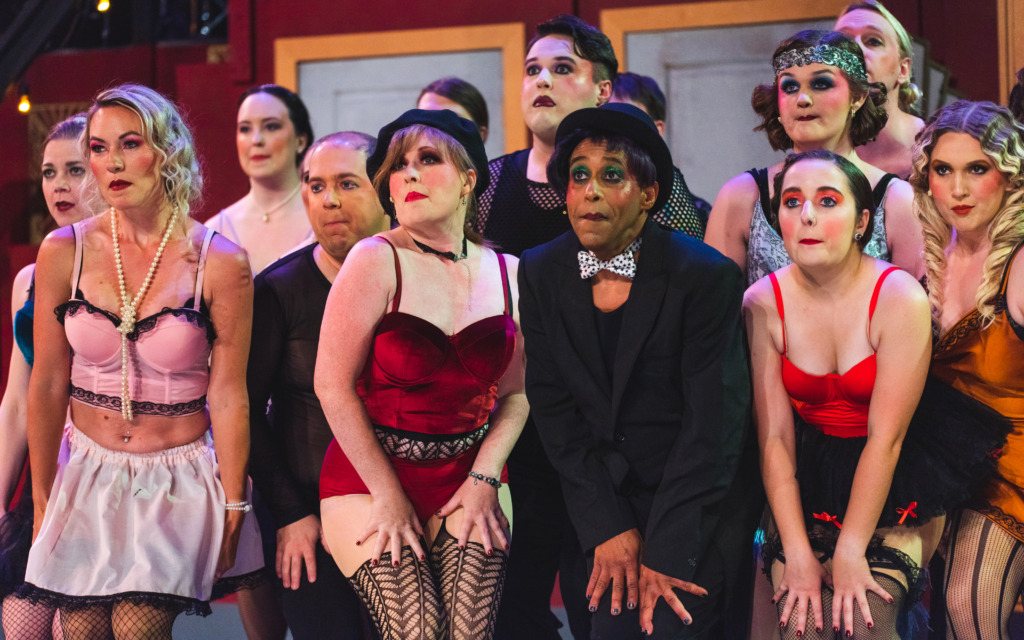
With the dream-team duo hard at work, they’ve hand-picked an extraordinary cast to weave these wonders of stage craft into a thoroughly affecting and haunting evening of theatrical entertainment. You’ve got ze Boys— Bobby (Austin Barnes) & Victor (Ryan Kaczmarczyk)! Or is it Victor and Bobby? Only one way to tell them apart…and that’s because Barnes doubles up as the Ape. In the suit. For “If You Could See Her.” And again the dancing delights that occur in that number (including a reverse leap & catch!) are just amazing. There’s Hans (Codey Odachowski) and Schatzchen (Aaron Knight), Otto (Stanton Zacker), Gunter (Kirby Smith), and Herman (Emily Jewett.) Ze Kit Kat Club boys double up as sailors and Nazis when the time comes and they do not disappoint. And of course, ze Kit Kat Girls! Texas, Lulu, Rosie, Frenchie, Helga, Fritzie, Gretel, Ilsa, and Brunhelde (played by the incomparably talented Lindsey Marie, Erin McArthur, Whitney Russell, Emily Garner, Sammi Flickinger, Sam Jednorski, Melanie Marcotte, Jillian Victoria, Vera Roell, and Anna Odell, respectively!) Each of these fine performers has little moments all throughout the performance where they radiate resplendence in their individuality. Lindsey Marie and Erin McArthur, as Texas and Lulu, get the giddy giggles dancing all around during “Two Ladies” and you get to hear Lindsey Marie shining her vocals as ‘the chanteuse’ during “Married” as well. And catch the insanely clever costuming on Vera Roell as ‘Ilsa’ who wears one half a lady costume stitched to the other half a man (which serves the beautiful LGBTQ+ inclusive message that Cabaret has to offer) as well as the gorgeous asymmetrical hairstyle! The ensemble is stellar. And you won’t be able to take your eyes off of them.
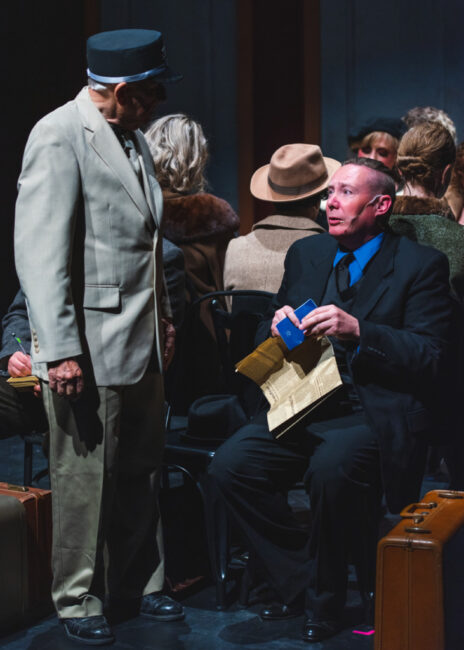
Outside of the singing, dancing ensemble are a few cameo players. Baltimore’s oldest, lively performer (the legendary Dave Guy, age 84) shows up as the rigid Customers Inspector on the train. At the other end of the spectrum you have Hazel Vogel (an actual child) performing “Tomorrow Belongs To Me”, which is on of the spookiest and most unsettling moments (when it happens in the show, because it all slides downhill into even more brutal territory after that), just hearing Vogel sing that voice, with the golden gramophone dimly lit centerstage, and the Emcee sitting there with it. You’ve got the wily Max (Gabe) who is seen giving grief to Sally, and there’s Bobby Sullivan as Ernst Ludwig. Simple and unassuming, Sullivan’s portrayal of this German patriot is almost endearing (I know the show well and even I fell for that simple, deceptive charm) right up until the moment where it isn’t. Sullivan has a sturdy voice, which melds into “Tomorrow Belongs to Me (Reprise)” and you start to feel the unease with him from the moment forward. The ensemble as a whole really sucker-punches the emotional wind out of you when they launch full-force into that number (started by Fraulein Kost, played by the stellar Kaitlyn Ruby and joined by the rest), blaring full intensity, blind loyalty, and manic-insane eyeball expressions that send the fear of the Third Reich screaming up in your spine, resulting in goosebumps so unsettling that nobody claps at the end of the first act.
The aforementioned Kaitlyn Ruby is a sparkly gem as the wayward Fraulein Kost. Her German accent is on point, well delivered without garbling her words, and her overall attitude in the role is zesty but balanced in such a way that you really appreciate the much-needed levity her character brings to the show. Constantly on the make with Sailor Boys (most frequently Kirby Smith and Stanton Zacker), you get a flirtatious and fun flavoring with her portrayal of this role, as well as snappy, fiery side when she goes through her little tête-à-têtes with Fraulein Schneider.
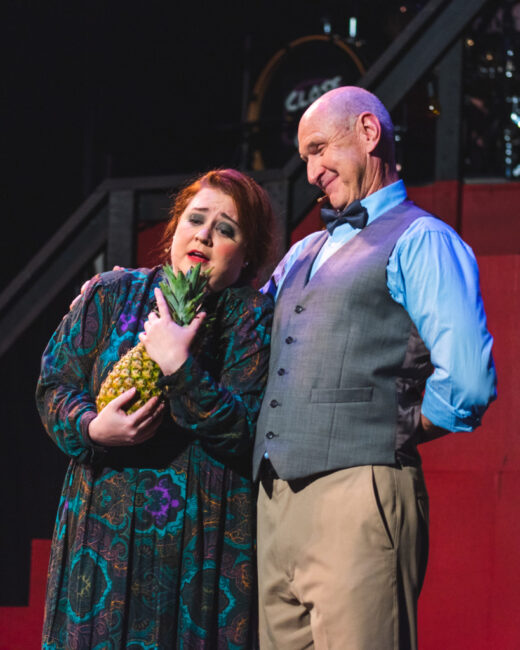
Fraulein Schneider (Katherine Boyce) and Herr Schultz (Phil Hansel) have become their own primary plot in this production. And it’s beautiful. There is this youthful exuberance shared by the pair of them that just makes their love story— from the coquettish little flirtations right up through the ending— so realistic. The words are failing me, because it’s Bambi Johnson’s vision and Boyce & Hansel’s performance, but there’s just something about the way this duo comes together that really hits you in a way that I’ve never felt before when seeing Cabaret. There’s an innocence, not a naivete, but a raw actualizing simplicity to their exchanges. It comes from a heart-warmed place of truth. You see these crinkled, older characters existing as sprightly, gay youths; it’s remarkable. And their voices! Hansel brings a decidedly lovely sound to “It Couldn’t Please Me More” and “Married”, with his voice marrying along divinely to Boyce’s. As for Boyce, she is another one that simply defies description. There’s a realness to the way she presents the character— buoyant with a tremendous amount of stage presence, which I think is why it’s so devastating to watch her when she belts her face off in that harrowing “What Would You Do.” You can hear the operatic sensationalism in Boyce’ voice both in that number and in “So What.” But they are vastly different songs, with a plethora of emotional turmoil— one colorful and light, the other malignant and heavy— and she does an astonishing justice to both. Boyce is newish to the musical theatre scene around these parts, but that woman is definitely going places; keep your eye on her.
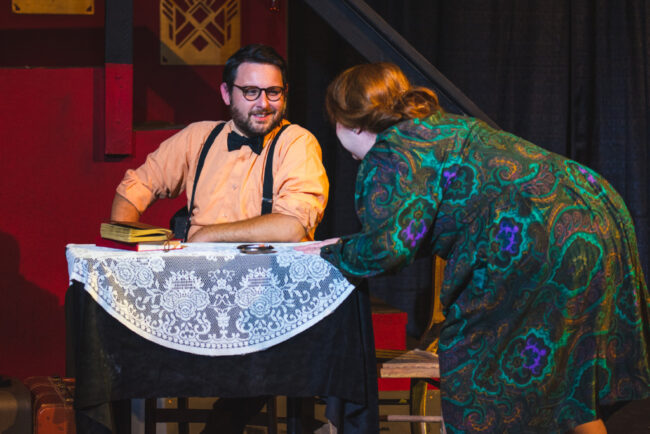
There was a Cabaret with an Emcee…and a novelist. The often dismissible, easily forgettable, and occasionally overlooked Clifford Bradshaw (Brandon Pfeltz.) Not for this production. Johnson works with Pfeltz to bring his character to the forefront of the action. The way she stages the lead-in to “Finale” (before the emotional evisceration that is “End of Show”) gives you that blindsiding notion that this entire experience could have possibly been a work of fiction inside Cliff’s head the whole time. Pfeltz puts on a tremendous show in the most fascinatingly unobtrusive way possible. He’s got that Pennsylvania edge affecting his speaking voice, and he’s got a sureness about him that creates this oddly out of place struggling writing who finds himself the center of this whirlwind of chaos that is Berlin on the precipice of Nazi rise to power. He’s emotionally charged and the way he handles Sally matches Sally’s level of unhinged but in a very, very different vein. Pfeltz also has a striking tonal quality to his voice, which Johnson does not let go to waste, by having him sing the lead-in to “Finale” (more traditionally performed solely by the Emcee.) Otherwise you get one brief glimpse of Pfeltz’ fabulous voice in “Perfectly Marvelous,” which is a semi-duet dominated mostly by Sally.
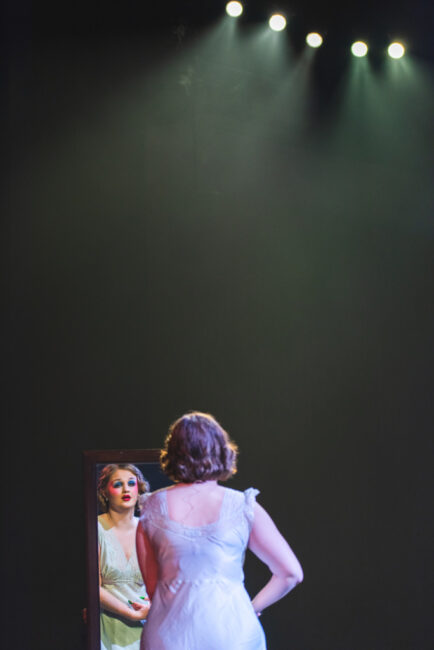
Unhinged, off-the-charts, larger-than-life, erratic, wild, the thesaurus pages are wearing thin trying to find ways to accurately describe what Kiley Ernest has manifested in her portrayal of Sally Bowles. Again, following the luminous path of Bambi Johnson’s “Not-your-grandma’s-Cabaret,” Ernest doesn’t take Sally down a rabbit hole, she plunges her from the top of the Empire State Building straight down the Marina Trench at warp speed. And her overly heightened ‘English’ accent is perfectly aligned with this larger-than-life caricature of Sally Bowles. You get the sassy, saucy, insane (check the cocaine-use moments because Johnson & Ernest don’t shy away from those moments either) confidence that floods through “Don’t Tell Mama” and “Mein Herr”, with belting brash vocals to back up all of that chutzpah. But what’s truly striking— gob-smackingly unexpected— is “Maybe This Time” and it’s not just because of the insanely genius staging with the mirror. The way Ernest lets go in this number— it’s not the pitiable Liza-Minelli-ballad we’ve all heard a million times. It’s something else, a seeping desperation that creeps out from the darkest reaches of Ernest’s soul; it’s phenomenal. And I can’t even get into that whacked-out, strung-out, maniacal trainwreck performance (and I say trainwreck to encapsulate the magnitude of how shocking and truly unhinged it is, so ‘best use possible’ of the word, if you will) of “Cabaret”, where Ernest’s vocal and emotional intensity is so bombastic she actually shocks and scares some of the Kit Kat Girls who are just watching helpless from the tables. Kiley Ernest is a perfectly marvelous fit for the role and it is unlike any Sally Bowles you’ve ever seen.
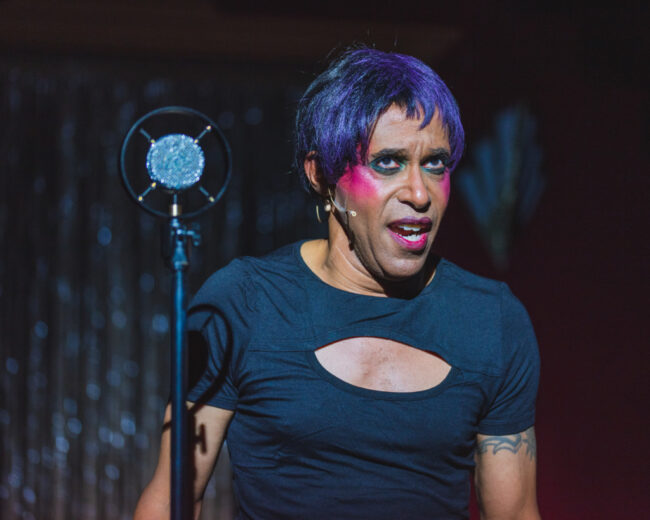
Words sound false trying to cobble together an accurate description that would do Eyvo any kind of justice for what he’s doing as the Emcee. I can’t just say Eyvo. Magnificent. Stunning. Unimaginable. (I could, but that doesn’t’ begin to dust the surface of what he’s doing in the role.) It’s enigmatic. Eyvo has this soul-in-flux about him as he portrays the Emcee. Is he in it? Is he a part of it? Is he manipulating it? Is he telling and recounting? Is he just playing around? All of that and none of that, literally everything everywhere all at once. It’s really, really impossible to describe. He’s not trying to service Alan Cumming, which is a blessing as so many try to go that route, and he’s not trying to become an over-the-top insane clown; there’s this queer and grounded reality of this Emcee, which is a little shady, a little questionable, and a lot of fun. Watching him be this puppet-master is fascinating in a way that I’m sure you’re meant to like? But you sort of can’t help but like? He draws you in, but not like a charlatan showman— like Kaa in the original animated Jungle Book. You trust his Emcee. But should you? It’s wild. Eyvo’s singing voice is superb and does all of the bouncy, beautiful things you’d expect during “Two Ladies” and “If You Could See Her”. There’s a hollowness to the way he delivers “I Don’t Care Much” which is a foreshadowing glimpse of the “End of Show” (which is so brutally beautiful that’s very, very difficult to watch, which is a testament to Eyvo’s emotional expressivity and overall capability as a performer.) His dancing is sensational and frequently on display, watch the kicks, the cartwheels, and all the magical, mystifying turns and tricks he pulls out all along the way. Eyvo toes that fine, fine line of aggressive and flirty and just ever-so-slightly insane. It’s a marvelous masterpiece to behold whilst simultaneously being a baffling confusion that settles heavy in your stomach, right up until the end.
There aren’t enough praises in the book (the good book, the dictionary, thesaurus, or otherwise) to do this work justice. It’s unlike any Cabaret you’ve ever seen before and yet feels exactly like what Cabaret is meant to feel like. The goosebumps you get from those brutal moments of horrifying truth, the spine-tingles, and heart-palpitations you experience from all of the darkness that Johnson and the company does not shy away from is extraordinary. It’s an extravaganza of talent, emotions, and experience all flying at you hard and fast. They have no troubles there. (Though you might have troubles if you don’t get your ticket to see it!) Life is a cabaret, and let me assure you— you do not want to miss this Cabaret.
Running Time: Approximately 2 hours and 40 minutes
Cabaret plays through June 17th 2023 with Phoenix Festival Theatre in the Chesapeake Center at Harford Community College— 401 Thomas Run Road in Bel Air, MD. For tickets call the box office at 443-412-2211 or purchase them in advance online.
